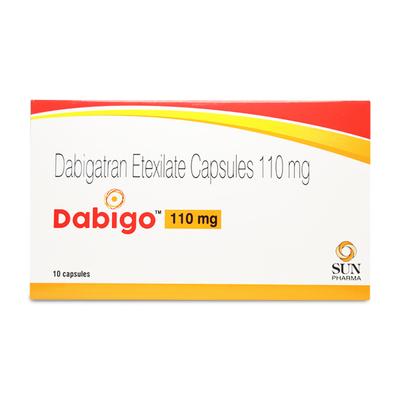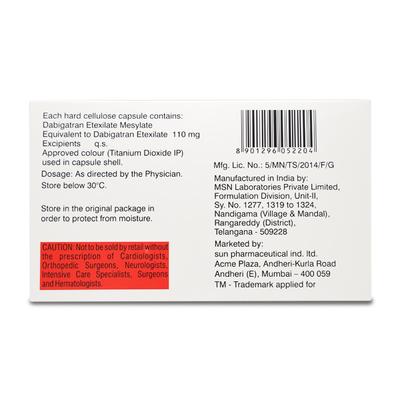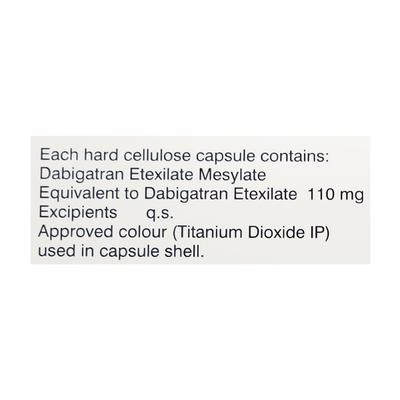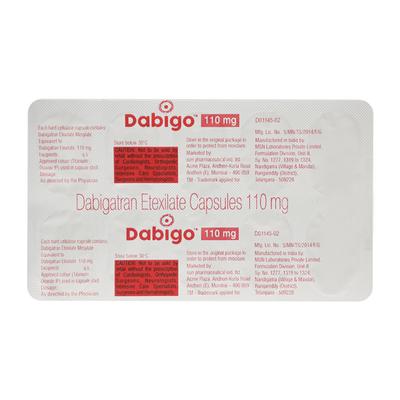

Netmeds First Membership
Quick Links
Introduction About DABIGO 110MG CAPSULE
Dabigo 110 mg Capsule contains Dabigatran, a direct thrombin inhibitor that supports healthy blood flow by reducing excessive clot formation. It is commonly prescribed for individuals with conditions such as irregular heart rhythm (atrial fibrillation), deep vein thrombosis (DVT), pulmonary embolism (PE), and to support recovery after hip or knee replacement surgeries. Dabigo helps maintain smooth circulation and lowers the risk of complications caused by unwanted blood clots.
This medicine is ideally suited for adults who require long-term support in maintaining balanced blood flow, especially those with heart rhythm disorders or a history of clot-related issues. It may also be recommended for post-surgical patients to minimize clot formation during recovery. The capsule should be taken orally with water, at the same time each day, and swallowed whole without crushing or chewing. Consistency in dosing plays a key role in achieving the desired benefit.
Before taking Dabigo 110 mg, it is essential to follow your doctor’s directions carefully. Avoid alcohol and herbal supplements that can increase bleeding risk. The capsule is not recommended during pregnancy or breastfeeding, and patients with severe kidney or liver problems should consult their doctor before use. Regular medical follow-ups help ensure safe and effective use, especially in elderly patients.
Common side effects of Dabigo 110 mg Capsule may include stomach discomfort, indigestion, nausea, or mild bleeding (such as gum or nosebleeds). Seek medical advice if you notice persistent or severe symptoms. Always inform your doctor about any other medicines you are taking before starting Dabigo to avoid unwanted interactions and ensure safe blood flow management.
Uses Of DABIGO 110MG CAPSULE
- Prevent stroke, systemic embolism and reduction of vascular mortality in adult patients with atrial fibrillation (Irregular rhythm)
- Prevent venous thromboembolic events in patients who have undergone orthopaedic surgery
- Manage acute deep vein thrombosis (DVT) and/or pulmonary embolism (PE)
- Prevent recurrent deep vein thrombosis (DVT) and /or pulmonary embolism (PE)
- Manage blood clots and to manage blood clots from reoccurring (in children)
Benefits of DABIGO 110MG CAPSULE
Dabigo 110 mg Capsule for Irregular Heart Rhythm
Dabigo 110 mg Capsule helps maintain balanced blood flow in individuals with an irregular heart rhythm, such as atrial fibrillation. It works by reducing the chances of unwanted blood clots that may occur due to abnormal heartbeats. This helps the heart circulate blood more efficiently throughout the body. Patients prescribed Dabigo should take it exactly as advised and have regular follow-ups to ensure proper heart rhythm control and safety.
Dabigo 110 mg Capsule for Replacement Surgery of Hip and Knee
After major orthopaedic procedures like hip or knee replacement surgery, Dabigo 110 mg Capsule is prescribed to support healthy blood flow and reduce the risk of clot formation during the recovery phase. Maintaining normal blood circulation helps lower the risk of post-surgical complications. Always take Dabigo at the same time each day as directed by your doctor and inform your healthcare provider before any follow-up procedures.
Dabigo 110 mg Capsule for Deep Vein Thrombosis (DVT)
Dabigo 110 mg Capsule supports patients with Deep Vein Thrombosis by managing the formation of blood clots in deep veins, usually in the legs. It helps keep blood flowing smoothly and reduces the risk of complications associated with restricted blood movement. Regular dosing and adherence to prescribed therapy are important to ensure effective and safe use. Consult your doctor for personalized guidance and dosage adjustments if needed.
Dabigo 110 mg Capsule for Pulmonary Embolism (PE)
In cases of Pulmonary Embolism, where blood clots travel to the lungs, Dabigo 110 mg Capsule helps promote proper blood circulation and reduce the chance of recurrence. It supports healthy lung function by preventing further clot-related blockages. Patients should take Dabigo under close medical supervision and immediately report symptoms like shortness of breath, chest pain, or coughing up blood to their doctor.
Dabigo 110 mg Capsule for Heart Attack and Stroke
Dabigo 110 mg Capsule helps lower the risk of clot-related events such as heart attack and stroke by maintaining consistent blood flow through the arteries. It works by limiting excessive clotting activity, allowing the heart and brain to receive an adequate blood supply. For best results, take the capsule regularly as prescribed and follow a heart-healthy lifestyle, including a balanced diet and regular medical check-ups.
How DABIGO 110MG CAPSULE Works
Mechanism of Action of Dabigo 110 mg Capsule
Dabigo 110 mg Capsule contains Dabigatran, a direct thrombin inhibitor. After ingestion, it converts into its active form, dabigatran, which blocks thrombin (Factor IIa) an enzyme responsible for forming blood clots. By inhibiting thrombin activity, Dabigo helps maintain smooth blood flow and reduces the risk of unwanted clot formation in blood vessels.
How to use DABIGO 110MG CAPSULE
How to Take Dabigo 110 mg Capsule
- Take Dabigo 110 mg Capsule exactly as prescribed by your doctor.
- Swallow the capsule whole with a full glass of water; do not crush, chew, or open it.
- It can be taken with or without food but try to take it at the same time each day for best results.
- If you miss a dose, take it as soon as you remember unless it’s almost time for your next one do not double the dose.
- Continue taking the medicine for the full duration prescribed, even if you feel well.
- Inform your doctor before any surgery or dental procedure, as you may need to stop the capsule temporarily.
What if I forgot to take DABIGO 110MG CAPSULE
- Take the missed Dabigo 110 mg Capsule as soon as you remember.
- If it is almost time for your next dose, skip the missed one and continue your regular schedule.
- Do not take a double dose to make up for the missed capsule, as this may increase bleeding risk.
- Try to take the capsule at the same time every day to maintain consistent blood levels.
- If you miss doses frequently, inform your doctor they can suggest ways to stay on schedule.
- Always follow your doctor’s guidance for safe and effective use.
Overdose
If you or someone else accidentally takes more than the recommended dose of Dabigo 110 mg Capsule, seek medical attention immediately by contacting your doctor or visiting the nearest hospital.
Side Effects Of DABIGO 110MG CAPSULE
Common side effects of Dabigo 110mg capsule:
- bleeding (nose, stomach or bowel, from penis/vagina or urinary tract)
- stomach-ache
- indigestion
- frequent loose or liquid bowel movements
- nausea
When to Seek Medical Attention?
Stop taking Dabigo 110mg capsule and contact your doctor if you experience any of the following side effects:
- signs of excessive bleeding such as exceptional weakness, tiredness, paleness, dizziness, headache or unexplained swelling
- serious allergic reaction which causes difficulty in breathing or dizziness
How To Manage Side Effects
Nausea And Vomiting
- Ginger tea or fresh ginger: Ginger has natural calming properties that help soothe the stomach. You can sip warm ginger tea or chew a small piece of fresh ginger.
- Stay hydrated: Take small sips of water, clear soups, or oral rehydration solutions. Avoid gulping large amounts of liquid at once.
- Eat light and bland foods: Choose foods like plain rice, toast, bananas, or boiled potatoes. Avoid spicy, oily, or heavy meals until you feel better.
- Peppermint: Inhaling peppermint oil vapors or sipping peppermint tea can help reduce the urge to vomit and relax your stomach muscles.
- Fresh air and rest: Sit in a well-ventilated area or take a short walk in fresh air. Rest in an upright position after eating to prevent nausea from worsening.
- Cold compress: Placing a cool, damp cloth on your forehead or the back of your neck can help relieve nausea, especially if it’s related to dizziness or heat.
- Avoid strong smells: Stay away from perfumes, cooking odors, or other strong scents that can trigger nausea.
- Deep breathing: Practice slow, deep breathing inhale through your nose, hold for a few seconds, and exhale slowly through your mouth. This helps relax the body and reduce nausea.
Stomach Pain
- Drink warm water: Sipping warm water helps relax the digestive muscles and can ease cramps or bloating. Avoid very hot or cold drinks, as they may irritate the stomach.
- Ginger tea: Ginger helps reduce inflammation and promotes digestion. Drink a cup of freshly brewed ginger tea or chew a small piece of ginger to soothe discomfort.
- Peppermint tea or oil: Peppermint relaxes the stomach muscles and reduces spasms. Sipping peppermint tea or inhaling its aroma may bring relief.
- Eat light and soft foods: Choose easily digestible foods like rice, bananas, applesauce, or plain toast. Avoid spicy, fatty, or fried foods until the pain settles.
- Apply a warm compress: Placing a hot water bag or heating pad on the abdomen helps reduce cramping and relax tense muscles.
- Stay hydrated: Drink plenty of fluids such as water, clear broths, or herbal teas to prevent dehydration, especially if the stomach-ache is accompanied by loose stools.
- Avoid lying down immediately after eating: Sit upright for at least 30 minutes after meals to support digestion and reduce acid reflux-related discomfort.
- Chamomile tea: Chamomile has calming properties that can help relax the stomach lining and ease mild stomach pain.
Warning & Precautions
Pregnancy
ContraindicatedDabigo 110 mg Capsule is not recommended during pregnancy. Always consult your doctor before using this medicine if you are pregnant.
Breastfeeding
ContraindicatedDabigo 110 mg Capsule is not recommended while breastfeeding. Seek your doctor’s advice before use.
Driving and Using Machines
Use with CautionThis medicine has no known effects on your ability to drive or operate machinery. However, always consult your doctor if you have concerns.
Alcohol
ContraindicatedAvoid consuming alcohol while taking Dabigo 110 mg Capsule and consult your doctor for guidance.
Kidney
ContraindicatedDabigo 110 mg Capsule is not recommended for patients with severely reduced kidney function. Your doctor will evaluate your kidney health before prescribing.
Liver
ContraindicatedPatients with severe liver disease or reduced liver function should avoid this capsule. Consult your doctor for advice before use.
Allergy
ContraindicatedDo not take Dabigo 110 mg Capsule if you are allergic to dabigatran or any other ingredient in the medicine.
Lungs
Use with CautionUse Dabigo 110 mg Capsule with caution in patients with lung problems, such as pulmonary embolism (blood clot in the lungs). Consult your doctor before use.
Heart Disease
Consult your doctorDabigo 110 mg Capsule is not recommended for patients with artificial heart valves that require permanent blood thinning. It should be used with caution in patients with heart problems, including heart attack or bacterial endocarditis. Always consult your doctor before starting this capsule.
Use In Pediatrics
Use with CautionDabigo 110 mg Capsule may be prescribed for children and adolescents (8–18 years old) under medical supervision to manage blood clot disorders. The dose will depend on age, body weight, and medical condition. Always follow your doctor’s instructions.
Use In Geriatrics
Use with CautionElderly patients (75 years or older) should use Dabigo 110 mg Capsule with caution. Your doctor will monitor your health closely to ensure safe use.
Other Warnings for DABIGO 110MG CAPSULE
Before taking Dabigo 110mg capsule, inform your doctor if you:
- have increased bleeding risk such as surgical tissue removal (biopsy), serious injury (bone fracture, head injury or any injury requiring surgical management), inflammation of the gullet or stomach, reflux of gastric juice into the gullet
- have symptoms of dehydration such as feeling thirsty and passing reduced amounts of dark-coloured (concentrated) or foaming urine
Who should not take DABIGO 110MG CAPSULE
Dabigo 110mg capsule is not recommended for use if you:
- have bleeding problems
Safety Advice
- Take Dabigo exactly as prescribed by your doctor. Do not change the dose on your own.
- Inform your doctor if you are taking other blood-thinning medicines, NSAIDs, or herbal supplements.
- Watch for signs of bleeding, such as unusual bruising, nosebleeds, blood in urine or stool, or prolonged cuts.
- Report any stomach discomfort, nausea, or dizziness to your doctor.
- If you have kidney or liver problems, your doctor may adjust your dose or monitor your condition closely.
- Before surgery, dental procedures, or invasive treatments, tell your doctor you are taking Dabigo.
- Do not skip doses and follow the exact timing recommended by your doctor.
- If a dose is missed, take it as soon as you remember unless it is almost time for the next one never double the dose.
Diet and Lifestyle Advice
- Maintain a consistent diet: Dabigo is less affected by vitamin K, but keeping a regular diet helps overall blood consistency.
- Stay hydrated: Drink adequate water daily to support kidney function and help the body manage the medication effectively.
- Limit herbal supplements: Certain herbs like Ginkgo, garlic, ginger, or ginseng may increase bleeding risk. Consult your doctor before using them.
- Balanced meals: Eat a diet rich in fruits, vegetables, and whole grains to support general health, but avoid sudden major changes in diet.
- Exercise carefully: Engage in regular physical activity, but avoid high-risk activities that may cause injuries or falls.
- Monitor for signs of bleeding: Watch for unusual bruising, nosebleeds, or blood in urine or stool while following your lifestyle routine.
- Manage body weight: Maintaining a healthy weight may support heart and vascular health, complementing your medication regimen.
- Travel precautions: Carry your medicine and a list of all medications when traveling. Be mindful of time zone changes for consistent dosing.
- Routine medical check-ups: Regular check-ups help monitor the safety and effectiveness of Dabigo while maintaining your diet and lifestyle.
1. Dabigo 110 mg Capsule vs Dabigo 75mg Capsule
|
Feature |
Dabigo 110 mg Capsule |
Dabigo 75 mg Capsule |
Notes |
|
Strength |
Higher dose |
Lower dose |
110 mg delivers a stronger effect for maintaining blood flow balance |
|
Typical Use |
Prescribed for patients needing higher anticoagulant support |
Prescribed for patients requiring lower anticoagulant support or with kidney concerns |
Doctor decides based on health condition, age, and kidney function |
|
Bleeding Risk |
Slightly higher due to stronger dose |
Lower compared to 110 mg |
Close monitoring is needed, especially in elderly patients |
|
Suitability |
Adults with normal kidney function or specific conditions |
Adults with mild kidney impairment or at higher bleeding risk |
Always follow doctor’s guidance for dose selection |
|
Frequency & Administration |
Usually once or twice daily as prescribed |
Usually once or twice daily as prescribed |
Timing consistency is important for both strengths |
2. Dabigo 110 mg Capsule vs Warfarin
|
Feature |
Dabigo 110 mg Capsule |
Warfarin |
Notes |
|
Mechanism of Action |
Direct thrombin inhibitor |
Vitamin K antagonist |
Dabigo works directly on thrombin; Warfarin affects clotting factors indirectly |
|
Monitoring Required |
Routine monitoring not usually required |
Regular INR blood tests needed |
Dabigo offers more convenience for daily use |
|
Onset of Action |
Rapid (within hours) |
Slow (several days) |
Dabigo acts faster in regulating blood consistency |
|
Diet Restrictions |
Minimal dietary restrictions |
Sensitive to vitamin K intake (leafy greens) |
Dabigo is easier to manage with a consistent diet |
|
Drug Interactions |
Moderate; certain P-gp modulators and anticoagulants |
Many drug interactions |
Dabigo has fewer interactions compared to Warfarin |
|
Bleeding Risk |
Moderate; must be monitored |
Moderate to high; risk affected by INR |
Both require attention to bleeding signs |
|
Convenience |
Fixed-dose capsules |
Dose adjustments frequently needed |
Dabigo is easier for patients who prefer stable daily dosing |
Drug - Drug interaction
1. Other Anticoagulants (e.g., Warfarin, Heparin)
- Interaction: Taking Dabigo with other blood-thinning medicines may increase the risk of excessive bleeding.
- Management: Avoid using together unless closely monitored by a doctor. Your doctor may adjust doses or recommend regular blood tests.
2. Antiplatelet Medicines (e.g., Aspirin, Clopidogrel)
- Interaction: Combining Dabigo with antiplatelets can further increase bleeding risk.
- Management: Use only under doctor supervision. Avoid self-medication with over-the-counter antiplatelets.
3. Non-Steroidal Anti-Inflammatory Drugs (NSAIDs, e.g., Ibuprofen, Naproxen)
- Interaction: NSAIDs may increase the risk of stomach bleeding when used with Dabigo.
- Management: Use alternatives if possible or take under strict medical guidance. Report any stomach pain or unusual bruising immediately.
4. P-Glycoprotein (P-gp) Modulators (e.g., Verapamil, Amiodarone, Ketoconazole)
- Interaction: Some medicines that affect P-gp may increase Dabigo levels in the blood, raising bleeding risk.
- Management: Doctors may adjust Dabigo dose or monitor more frequently. Avoid starting new P-gp modulators without guidance.
5. Herbal Supplements (e.g., Ginkgo Biloba, Garlic, Ginseng, St. John’s Wort)
- Interaction: Certain herbal products can increase bleeding risk or affect Dabigo absorption.
- Management: Always inform your doctor before using herbal supplements. Do not start new herbal products while taking Dabigo without approval.
6. Other Medications Affecting Kidney Function
- Interaction: Medicines that reduce kidney function (like certain diuretics or NSAIDs) may alter Dabigo clearance, increasing bleeding risk.
- Management: Kidney function may be monitored more closely, and dose adjustments may be necessary.
7. Surgery or Medical Procedures
- Interaction: Using Dabigo around the time of surgery or invasive procedures can increase bleeding risk.
- Management: Your doctor may advise temporarily pausing the capsule before surgery or dental procedures. Follow the doctor’s instructions carefully.
Drug - Food interaction
1. Foods Affecting Blood Clotting (e.g., certain leafy greens)
- Interaction: Unlike some other anticoagulants, Dabigo is less affected by vitamin K in foods. However, extreme dietary changes may still influence overall blood consistency indirectly.
- Management: Maintain a consistent diet and inform your doctor if you make major changes to your intake of leafy greens.
2. Herbal Foods and Supplements (e.g., Ginkgo, Garlic, Ginger)
- Interaction: Certain herbs and herbal supplements may increase bleeding risk when combined with Dabigo.
- Management: Avoid or limit herbal supplements unless approved by your doctor. Always disclose any herbal intake.
3. High-Fat Meals
- Interaction: A very high-fat meal may slightly delay Dabigo absorption.
- Management: Take the capsule consistently, either with or without food, as prescribed. Avoid changing meal patterns drastically without consulting your doctor.
4. Hydration and Fluids
- Interaction: Dehydration may reduce kidney function, which can affect Dabigo clearance and increase bleeding risk.
- Management: Drink adequate water daily unless otherwise advised by your doctor. Monitor for dark or concentrated urine.
Synopsis
|
Drug |
|
|
Pharmacological Category |
Oral anticoagulant (Direct thrombin inhibitor) |
|
Therapeutic Indication |
Support in maintaining normal blood consistency in patients at risk of blood clot formation |
|
Dosage Forms |
Capsule, Tablet |
More Information
Storage
- Keep the medicine out of reach in children
- Store Dabigo 110mg capsule at room temperature
FAQs About DABIGO 110MG CAPSULE
Q: What is Dabigo 110 mg Capsule used for?
A: Dabigo 110 mg Capsule contains dabigatran, an oral anticoagulant. It helps maintain proper blood flow in people who may have a higher risk of clot formation. Doctors usually prescribe it after certain heart or blood vessel conditions. It works by regulating the activity of thrombin, a protein involved in clotting. The capsule is taken under medical supervision. Follow your doctor’s guidance for dose and timing. It comes in a convenient oral form, making regular use easier.
Q: What are the common side effects of Dabigo 110 mg Capsule?
A: Some people may notice mild side effects such as stomach discomfort, nausea, or minor bruising. Others may experience bleeding from gums or nosebleeds. Most side effects are mild and manageable. If you notice unusual or heavy bleeding, contact your doctor immediately. Inform your doctor about any side effects before they worsen. Regular check-ups help monitor safety.
Q: Are there serious side effects?
A: Serious side effects may include prolonged or heavy bleeding, severe bruising, or blood in urine or stool. Rarely, allergic reactions like rash, swelling, or difficulty breathing can occur. Seek medical attention immediately if any of these happen. Doctors monitor blood parameters to reduce serious risks. Never stop the medicine without consulting your doctor. Safety is closely linked to proper usage and monitoring.
Q: Can I take Dabigo 110 mg Capsule with other medicines?
A: Some medicines can affect how Dabigo 110 mg Capsule works, especially other blood-thinning drugs, certain painkillers, or heart medications. Herbal supplements may also have interactions. Always tell your doctor about all medicines and supplements you are taking. Avoid starting new medicines without approval. Your doctor may adjust your dose or monitor you more closely.
Q: What should I avoid while taking Dabigo 110 mg Capsule?
A: Avoid alcohol and medicines that increase bleeding risk without your doctor’s advice. Do not crush, chew, or break the capsule. Inform your doctor before any surgery or dental procedure. Maintain regular doctor visits. Avoid starting new supplements without consultation.
Q: What should I do before surgery?
A: Inform your doctor and surgeon that you are taking Dabigo 110 mg Capsule. Your doctor may advise stopping it temporarily before surgery or dental procedures. This helps reduce bleeding risk during and after the procedure. Follow the exact instructions and timing provided by your doctor.
Q: What should I do if I notice unusual bleeding?
A: If you notice heavy bleeding, prolonged nosebleeds, or blood in stool or urine, contact your doctor immediately. Avoid self-adjusting your dose. These signs may indicate a need for medical monitoring. Keep track of any changes and report them during your next check-up.
Q: Can Dabigo 110 mg Capsule cause stomach problems?
A: Some patients may experience mild stomach discomfort, heartburn, or nausea. Taking the capsule with food may help reduce these effects. Persistent or severe stomach problems should be reported to your doctor. Do not self-medicate with over-the-counter remedies without guidance.
Q: Can I take herbal supplements with Dabigo 110 mg Capsule?
A: Some herbal products may affect blood flow or clotting. Always inform your doctor about any herbal supplements or vitamins you are taking. Your doctor will advise if they are safe or if adjustments are needed. Avoid starting new supplements without approval.
Q: Can I drink lots of water while taking Dabigo 110 mg Capsule?
A: Yes, staying hydrated is helpful, especially if you notice signs of dehydration like dark or foamy urine. Proper hydration may help maintain healthy kidney function. Drink a consistent amount of water daily unless your doctor advises otherwise.
Q: How can I stay safe while taking Dabigo 110 mg Capsule?
A: Follow your doctor’s dosing instructions carefully. Attend regular check-ups and report any unusual bruising, bleeding, or fatigue. Avoid alcohol and certain medications without advice. Store capsules properly and keep a complete list of all medicines and supplements. Consult your doctor before surgery or medical procedures. Safe use and monitoring help maintain effectiveness.
References
1. KD. Tripathi. Drugs Affecting Coagulation, Bleeding and Thrombosis. Seventh edition. 2013. Page – 623.
2. Boehringer Ingelheim. Safety of Dabigatran Etexilate in Blood Clot Prevention in Children. NIH U.S. National Library of Medicine ClinicalTrials.gov. [Revised in 4th June 2020] [Accessed on 24th October 2025] ![]()
3. Eline A Dubois and Adam F Cohen. Dabigatran etexilate. NIH National Library of Medicine, National center for biotechnology information. PMC PubMed Central. July 2010. [Accessed on 24th October 2025] 
4. Teerapat Nantsupawat, Suthipong Soontrapa, Nopakoon Nantsupawat, David Sotello, Saranapoom Klomjit, Selcuk Adabag and Alejandro Perez-Verdia. Risk factors and prevention of dabigatran-related gastrointestinal bleeding in patients with atrial fibrillation. NIH National Library of Medicine, National center for biotechnology information. PMC PubMed Central. [Revised in 14th December]. [Accessed on 24th October 2025] 
5. Boehringer Ingelheim Pharmaceuticals, Inc. PRADAXA. [Revised in June 2025] [Accessed on 24th October 2025] 
6. Boehringer Ingelheim International GmbH. Electronic medicines compendium (EMC). [Revised in February 2024] [Accessed on 24th October 2025] 
7. Boehringer Ingelheim Pharmaceuticals, Inc. U.S. Food & Drug Administration (EMC). [Revised in November 2015] [Accessed on 24th October] 















